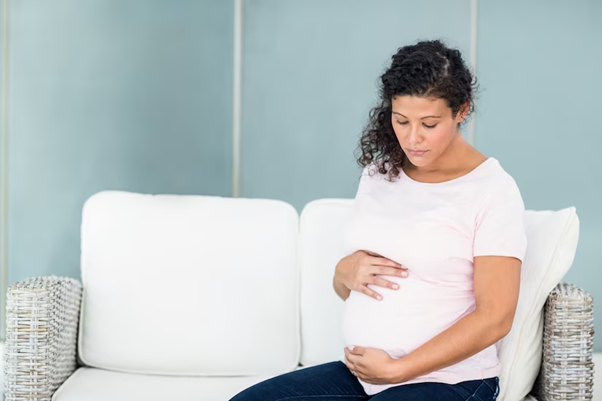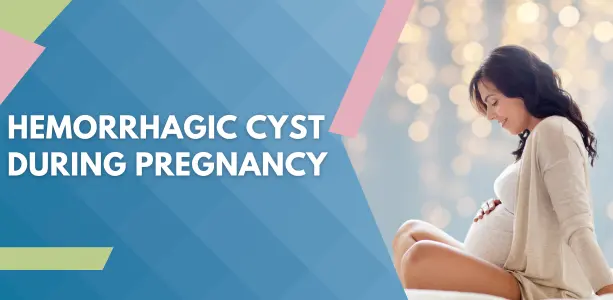Dealing with a hemorrhagic cyst during pregnancy can be worrying, but it’s often not serious. These cysts are common and usually don’t affect your pregnancy. We’ll explain what these cysts are, their symptoms, and how they’re handled, aiming to ease your concerns.
Additionally, Saraogi Hospital provides affordable IVF, IUI, and Surrogacy treatments for those facing fertility challenges. Founded by Mohit Saraogi, we strive to offer the best care in Mumbai, helping couples achieve their dream of parenthood.
Navigating hemorrhagic cysts during pregnancy? Let us guide you safely. Contact us today!
Hemorrhagic cysts during pregnancy pose a delicate balance between maternal health and foetal safety, requiring careful navigation.
Hemorrhagic cyst during pregnancy

During pregnancy, some women might develop ovarian cysts, which are fluid-filled sacs on the ovaries. These cysts are quite common but often go unnoticed. If you start feeling really sick, there are simple things you can try to feel better. These changes in your body can be tough to deal with, especially when you’re pregnant.
Doctors can spot these cysts with a regular ultrasound during pregnancy checkups. If you have one, they’ll monitor it to ensure it doesn’t cause problems. Most of the time, these cysts don’t affect your pregnancy or your baby.
But if you’re feeling any unusual pain or discomfort because of ovarian cysts during pregnancy, it’s best to talk to your doctor. They’ll make sure you and your baby stay safe and healthy throughout the process.
Dealing with a hemorrhagic cyst during pregnancy? Take control of your well-being and reach out to us today for expert guidance and support!
Yes, it’s possible to be pregnant with a hemorrhagic cyst, although it can potentially complicate the pregnancy and may require close monitoring professionals.
Can you be pregnant with a hemorrhagic cyst?
Yes, you can be pregnant and have a hemorrhagic cyst at the same time. A hemorrhagic cyst is a type of ovarian cyst that is filled with blood. These cysts are pretty common in women who can have babies, and they can also show up during pregnancy. Most of the time, they don’t cause any trouble for your pregnancy. They usually go away on their own and don’t need any special treatment.
When you’re pregnant, your body undergoes many changes, and sometimes, these changes can cause cysts like these to form. While they might make you feel uncomfortable or cause a bit of pain, they are generally not dangerous for you or your baby.
But if you find out you have one while you’re pregnant, your doctor will want to monitor it to make sure it doesn’t get bigger or cause any problems. It’s always good to check with your doctor if you’re worried about anything during your pregnancy.
Concerned about a possible pregnancy with a hemorrhagic cyst? Don’t hesitate to seek professional guidance and support—contact us today for personalised care.
Hemorrhagic cysts during pregnancy can occur due to hormonal fluctuations and increased blood flow to the ovaries.
Chances of hemorrhagic cyst during pregnancy

The chances of having a hemorrhagic cyst during pregnancy are not rare because ovarian cysts can happen quite a bit when you’re expecting. These cysts happen when a blood vessel in the cyst’s wall breaks and fills the cyst with blood.
When you’re pregnant, your body makes a lot of hormones. These hormones can cause the ovaries to make cysts. Most of these cysts are not harmful and doctors often find them during regular pregnancy check-ups.
One common type of cyst during pregnancy is the corpus luteum cyst, which sometimes can become a hemorrhagic cyst. The corpus luteum is very impocyst during pregnancy.
In the early part of pregnancy, the ovary often produces a hormone that helps sustain the pregnancy until the placenta is ready to take over. Sometimes, this cyst can fill with blood, turning into a hemorrhagic cyst.
Even though it’s not uncommon to have these cysts during pregnancy, they usually don’t cause any problems. Doctors keep an eye on them with ultrasound to see how big they get and if they change. Many times, these cysts go away on their own without needing any treatment. If you’re pregnant and worried about cysts, the best thing to do is talk to your doctor. They can give you the most accurate information and make sure you and your baby are healthy.
Curious about the likelihood of a hemorrhagic cyst during pregnancy? Reach out for expert advice tailored to your situation today.
The causes of hemorrhagic cysts include ovulation, hormonal fluctuations, or ovarian trauma, among other factors.
Causes of hemorrhagic Cyst during Pregnancy
Hemorrhagic cysts during pregnancy happen because:
Egg Release: Occasionally, after an egg is released, the space it leaves behind fills up with blood instead of disappearing.
After the Egg is Released: The area where the egg was released should prepare for a baby by producing special body chemicals. However, it can fill with blood and develop into a cyst.
Pregnancy Hormones: Pregnancy brings about significant changes in the body’s chemical composition. These changes can sometimes lead to the formation of cysts.
Cyst Wall Breaks: If the wall of the cyst breaks a little, blood can get inside and make it a hemorrhagic cyst.
Mostly, these cysts are not a problem and disappear by themselves. But if you feel pain or something feels wrong, it’s always good to check with a doctor.
Wondering about the causes of hemorrhagic cysts? Connect with us for personalized insights and guidance.
Hemorrhagic cysts during pregnancy necessitate a delicate balance between ensuring maternal health and safeguarding fetal well-being.
Symptoms of hemorrhagic cyst during pregnancy

When you have a hemorrhagic cyst during pregnancy, you might not always know it’s there because sometimes there are no symptoms. But if there are signs, here’s what you might notice:
Pain in One Side of Your Belly: You might feel a sharp or dull ache on the side of your belly where the cyst is.
Bloating: Your belly might feel swollen or more full than usual.
Pain During Activities: Certain activities, such as being active or even going to the bathroom, could make the pain worse.
Sudden, Severe Pain: If the cyst bursts (which is rare), it can lead to a sharp, sudden pain in your abdomen.
Changes in Periods: While you won’t have periods during pregnancy if you had a cyst before knowing you were pregnant, it might have influenced changes in your menstrual cycle.
Remember, having a cyst when you’re pregnant is usually not a big problem, and they often go away on their own. But if you feel any pain or something doesn’t seem right, it’s always a good idea to tell your doctor so they can make sure everything is okay.
The diagnosis of a hemorrhagic cyst during pregnancy relies on ultrasound imaging and clinical assessment to ensure maternal and fetal well-being.
Diagnosis of hemorrhagic cyst during pregnancy
To find out if someone has a hemorrhagic cyst during pregnancy, doctors usually do a few things:
Ultrasound: This is a machine that uses sound waves to create pictures of the inside of your body. It can show the cyst on your ovary and help the doctor see what it looks like.
Medical History and Physical Exam: The doctor will discuss your symptoms and might check your stomach to see if it’s tender or swollen.
Blood Tests: Sometimes, doctors do blood tests to check for signs of infection or other related issues.
Follow-up Ultrasounds: If you have a cyst, the doctor might want to do more ultrasounds later to see if the cyst is getting bigger, smaller, or staying the same.
Most of the time, hemorrhagic cysts during pregnancy are detected during a routine ultrasound. These cysts typically don’t cause issues and may resolve on their own.
However, the doctor will monitor it closely to ensure both you and the baby are doing well.
Worried about a hemorrhagic cyst during pregnancy? Let us help with accurate diagnosis and personalized care.
Complications from a hemorrhagic cyst during pregnancy can include ovarian torsion, rupture, or interference with pregnancy progression. This may necessitate careful monitoring and possibly medical intervention.
Complications due to hemorrhagic cyst during pregnancy
Some rare cases, can lead to complications:
Rupture: If the cyst bursts, it can cause severe pain and internal bleeding. This situation needs immediate medical attention.
Ovarian torsion: Sometimes, the cyst can cause the ovary to move from its usual position, potentially cutting off its blood supply. This condition, known as ovarian torsion, can lead to severe pain and loss of the ovary if not treated quickly.
Pain: Even if they don’t lead to more serious issues, hemorrhagic cysts can cause discomfort or pain, which might need management during pregnancy.
Interference with Pregnancy: Very rarely, a cyst might affect the pregnancy if it becomes very large or causes other issues, but this is uncommon.
It’s important to have regular check-ups with your doctor during pregnancy to monitor any cysts and manage potential complications promptly.
Experiencing complications from a hemorrhagic cyst during pregnancy? Reach out to us for expert guidance and support tailored to your unique situation.
How to treat hemorrhagic cyst during pregnancy
Treating a hemorrhagic cyst during pregnancy usually involves a careful watch-and-wait approach because many cysts resolve on their own without needing treatment. However, the approach can vary based on the cyst’s size, the symptoms it causes, and how far along the pregnancy is. Here are the general steps for treatment:
Monitoring: Regular ultrasounds are used to check the cyst’s size and growth. Most of the time, doctors just keep an eye on it.
Pain Management: If the cyst causes pain, doctors might recommend rest or suggest safe pain relief methods that won’t harm the baby.
Surgery: In rare instances, if the cyst is exceptionally large, causing severe symptoms, or poses a risk of ovarian torsion (twisting of the ovary), surgery may be necessary. Surgery during pregnancy is conducted with great caution to avoid any harm to the baby.
Follow-up Care: After treatment, you’ll have follow-up visits to make sure everything is okay with you and the cyst.
It’s important to work closely with your healthcare provider to choose the best treatment plan for you and your baby, ensuring both safety and comfort.
Seeking treatment options for a hemorrhagic cyst during pregnancy? Contact us for personalized care and expert guidance to ensure the well-being of you and your baby.
Frequently Asked Questions
1. Can a hemorrhagic cyst affect my pregnancy?
Most of the time, a hemorrhagic cyst won’t affect your pregnancy. They often go away on their own. But your doctor will keep an eye on it just to be safe.
2. What does a hemorrhagic cyst feel like during pregnancy?
You might not feel it at all, but if you do, it could be a sharp pain or discomfort on one side of your belly. Sometimes, you might feel bloated.
3. Do I need surgery for a hemorrhagic cyst if I’m pregnant?
Surgery is rare. It’s only needed if the cyst is very big, causes a lot of pain, or if there’s a risk of the ovary twisting.

